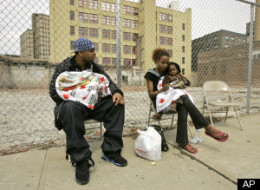
Released Tuesday, the U.S. Conference of Mayors 2010 Status Report on Hunger & Homelessness in American Cities -- in their annual assessment of 26 American cities -- has tallied a 9 percent overall increase in the number of homeless families in the U.S in the past year. Fifty-eight percent of the cities analyzed showed an increase in family homelessness.
Based on this survey, on an average night, 1,105 family members are on the streets, 10,926 find refuge in an emergency shelter, and 15,255 stay in transitional homes.
Trapped in this deteriorating economy, low-income families find themselves stuck in financial sinking sand and, though they have work, must move out of their homes, and onto the streets because of low wages.
Peggy Rivera, the Oxnard Commission on Homelessness' chairwoman, spoke with theVentura County Star about the homeless families in their city:
We have whole families that have lost their homes and don't have the credit rating to get into another apartment and don't have the savings to afford first- and last-month rent payments.These are working families. They just don't have the resources to put a roof over their head.
Another report conducted this winter by the Working Poor Families Project found that in 2009, "forty-five million people, including 22 million children, lived in low-income working families" -- a population distressed over the past year.
Maria Foscarinis, executive director for the National Law Center on Homelessness & Poverty, spoke with the Huffington Post on the rise in family homelessness spelled out in the report. "Many of these folks are children. That means a lot of kids are experiencing homelessness, and that can be very devastating for them in terms of impact on their mental health," she says. "It can have an impact on their schooling. That can affect their long-term ability to be employed in a meaningful way.
"We're really worried about the prospects for the future."
Take the Correa family of Sarasota County; their story is familiar to many. Gabriel Correa -- father of four -- spoke with the Herald Tribune about his temporary job:
When I am working, we can survive, but when I can't find work, it is a battle.
Before the recession, Correa and his wife, Maria Alarcon, were able to make ends meet and provide for their children. Without consistent and decent-paying work, Correa finds it hard to keep a roof over their heads.
Seventy-nine percent of the households with children accounted for in the U.S. Conference of Mayors Report claimed that the main cause was unemployment, and 72 percent declared lack of affordable housing. Among other causes claimed by these families ( i.e. poverty and domestic violence), low paying jobs was mentioned as the main cause by one fifth of the population surveyed.
Homeless shelters will soon become overcrowded with the advancing winter weather. More and more families are losing their homes.
The Salvation Army asks that you sponsor a family this Christmas through their Adopt-a-Family Program. Common Ground, a nationwide organization working to end homelessness and re-house families, asks you to "Sponsor a Home" and help supply their apartments with the necessities families require to get back on track. You can also contact your local shelters and transition homes to find out specific ways you can lend a hand to the homeless families near you.
No comments:
Post a Comment